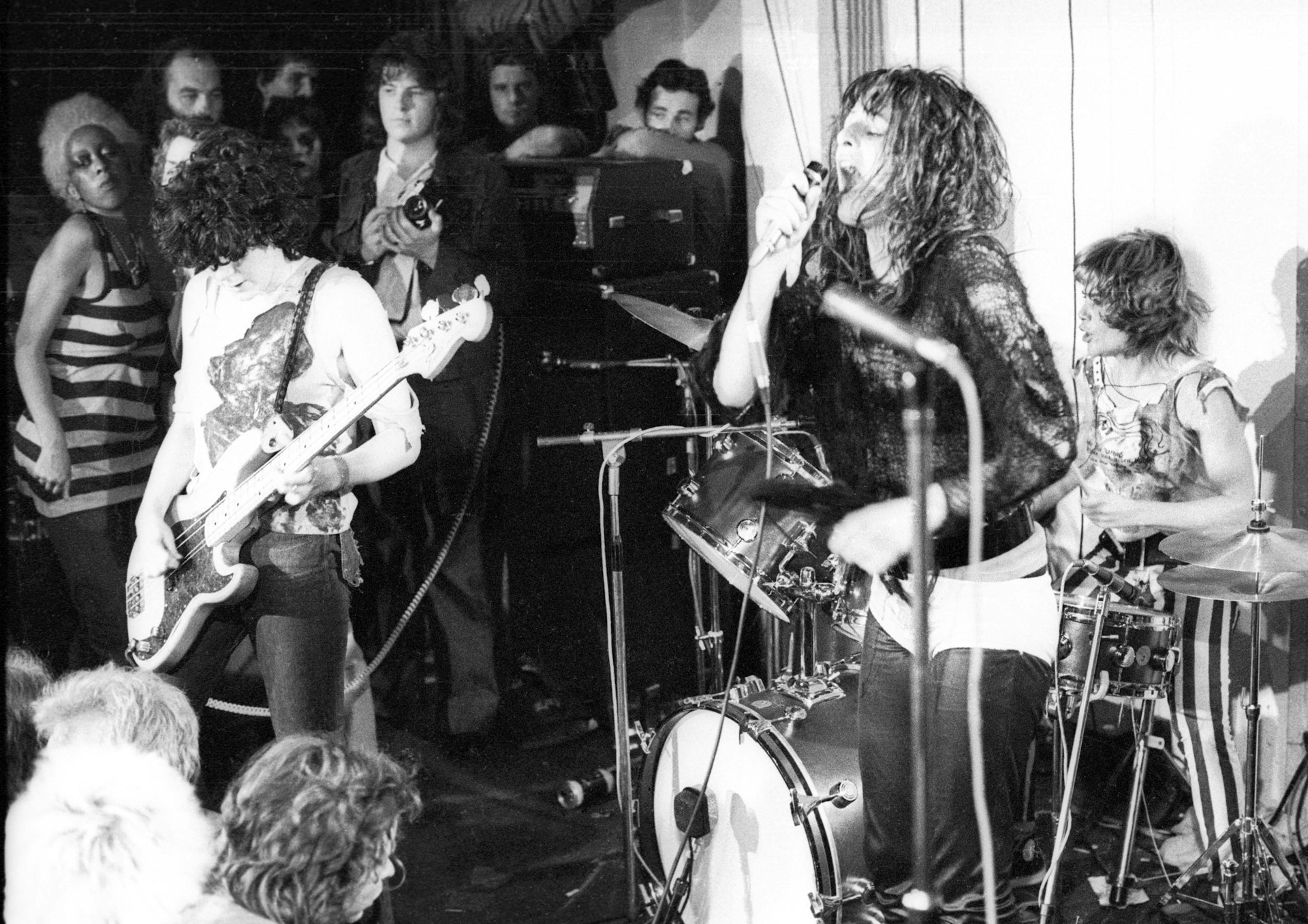- Text by Oliver Lunn
- Photography by Ian Dickson
“Guys didn’t know whether to fuck us or kill us,” says Slits guitarist Viv Albertine. She’s explaining the impact of the world’s first all-girl punk band and her place within it. Back in the mid-70s, The Slits elbowed their way into a male-dominated music industry, holding their own next to The Sex Pistols, The Clash and other punk titans. The Slits shook up the English establishment and patriarchal society. They questioned why they were supposed to look and act a certain way simply because they had breasts and lacked penises. In John Lydon’s words, “[they were] full of guts and quite insane”.
In the new documentary Here to be heard: The Story of the Slits – which is in its final stages of post-production and which you can support on Indiegogo here – we hear from the band themselves about living how they wanted to live, their humble beginnings, the frenzied gigs, the wider public response, and their passion for their art. We also hear from Don Letts (“they were threatening to men and certainly empowering for women”), Paul Cook (The Sex Pistols), Vivien Goldman (NYU’s punk professor) and many more. I called up the filmmaker – Federation X frontman William Badgley – to learn more about The Slits’ one-of-a-kind story.
Why was the story of The Slits interesting to you as a filmmaker?
Well, this is my second feature music doc, and I think that every time you do one of these you have to zero in on something, something that you think is the overriding principle, that is the widest umbrella for all the gifts, strengths, and weaknesses that a band has. For the first film [Kill All Redneck Pricks] it was very much about their friendship and I wanted – and still want – it always to be something where you don’t have to be a fan of the band to enjoy the film. So with this film the idea of this inability to be contained – the freedom and fearlessness – became very much the overriding principle, because you see it again and again, and it has positive affects and negative affects on the band. And that freedom and fearlessness is obviously really important to their story in terms of what they did for women specifically.
The thing about The Slits – the great fundamental truth – is they were just a band. They were just a band finding each other, expressing what they want to do together. But because of certain social situations outside of their control, they’re living under this idea that they’re not supposed to do that. Yet they do it anyway. So they sort of stepped through this area, and my favourite thing about them is that they never quit doing that.

Viv Albertine talks about mixing all the signs and confusing men (“Guys didn’t know whether to fuck us or kill us”). How do you feel they were perceived by men and women in the early days?
Well, from their descriptions of the situation, from the general populace, there was a wide sweep of total bewilderment. Not even positive or negative but more like, ‘I don’t know what this is’. They describe it as being like space aliens. And the funny thing about it in hindsight, and one of the challenges of the film, is that they did so much in terms of exploring and establishing fashion, that you’d be hard pressed to walk down the street in a major city today and see a girl that doesn’t look like that. I didn’t know anything about them when I was a kid – I grew up in the early ’90s – and there were so many parallels. It’s actually been a really positive thing in the Pacific Northwest [where the filmmaker grew up], but you know that thrift shop culture of putting the clothes together at piecemeal? They were at the forefront of that.
They said that people would cross the street to get away from them. I think that’s just the bewilderment and avoidance thing. And they were attacked. Ari was stabbed. And my impression from what they’ve told me, it was because they were literally breaking down this idea of, you know, women go over here, and the way that’s visually represented is they dress a certain way. It’s something that Gina Birch said: that, in the early 70s, shopping generally wasn’t like the way it is today – although some people might argue with me on this – where you can go in and there’s an option for defining your personality and who you are. She says that back then you went into the store and it was like, ‘What’s your gender?’ ‘I’m a woman.’ ‘Well, here you go.’ And it was just very limited.
What was the story behind Ari getting stabbed in London? Was it to do with these transgressions you mention?
It certainly seemed like it, because there was only one thing said, and it was a direct reference to the band name. This guy came up to them, outside Screen on the Green – and luckily it was wintertime so she was wearing a trench coat and jeans – and this guy came up behind her and stabbed her in the butt with this knife. It cut through the coat, through the jeans. And he said in her ear: ‘Here’s a slit for you,’ and left.
I think they enjoyed fashion though. They talk a lot about how it was a pivotal point in terms of women dressing not to be attractive and not preparing for an event, like you’re this artwork that’s going to be hung in a gallery at a social event, like, don’t leave the house unless you’re perfect in every way. There’s a lot of descriptions of them being like – and it’s very true to everything they did throughout their career – ‘this is just it; this is just what it is’. Like any guy would do.
And wasn’t Ari Up around 15 years old when they formed the band?
14!
So was she always super confident? How did she take to those early gigs?
I think so. The interesting thing about Ari is that she was selected for the band by Palmolive, who was dating Joe Strummer when he was Woody from the 101ers, and they were involved in the London squat scene. And together they went through that transformation, that famous transformation when Joe Strummer saw the Sex Pistols and realized what he was doing was over, and deciding to go into punk. She went with him and she wanted to start a band, so she started a band with Sid Vicious called the Flowers of Romance. Viv Albertine was in that band too. And the funny thing about that is the story about Sid Vicious hitting on [Palmolive] after a practice, which is really gutsy because she was dating Joe Strummer and they’re in their house and she wasn’t having it.
Did Sid Vicious know she was dating Joe Strummer?
I can only imagine! But I don’t know; it’s just described by her as this incredibly awkward situation. She doesn’t mention Joe Strummer at all, just the fact that [Sid Vicious] was being so awkward that she was just like, ‘no, that’s not why I’m here’. She says that’s what made her think, why not do all-girls, because then we can actually do what we came here to do. So anyway she goes to a Patti Smith concert, and there she meets Ari and Ari’s mum, who’s a very interesting character, a German show promoter in the 60s. So Ari grew up with Jon Anderson from Yes and Jimi Hendrix, and Ari’s description of Hendrix was so great: ‘I knew he had a band but I’d never heard of it and I thought of him as the guy in the living room’. Where women at that time were figuratively growing up in a room full of male rock icons, Ari was literally growing up in room full of male rock icons. So anyway, at the Patti Smith concert, Ari throws a fit on the floor; just like, ‘fuck this, fuck that,’ just going crazy. And Palmolive sees her from across the room and was like, ‘that’s the front person’. So yeah, to answer your question, it could not be more natural for her.
Check out Here to be heard: The Story of the Slits on Indiegogo.
